Lecture programme Wednesday 12 March
The lectures are in English unless stated otherwise. The lecture programme is subject to change.
If you’re looking at this page on mobile, please turn your phone in horizontal mode for a clear overview of the theatres.
Theater 1
Theater 2
THE linen project
The Linen Project explores how a local linen production chain can take shape in the 21st century, emphasizing relationships, sustainability, and shared values over financial growth. By involving citizens in growing and making textiles, the project aims to reconnect people with the process, counteracting the social and ecological disconnect caused by the globalized textile industry.
Hosted by The Linen Project
Material innovation
This session explores material innovation and sustainability, featuring designers who transform waste into new possibilities. Shushanik Droshakiryan redefines textiles using Dutch wool waste, while Jules Péan repurposes industrial debris into new geological materials. Their work challenges traditional production, promotes circularity, and reimagines the future of sustainable design.
Moderator: Leonne Cuppen

10:45 – 11:15
Joan den Exter, The Linen Project
The Linen Economy (NL)
Joan den Exter, who has been working in the fashion industry for over thirty years, has a keen interest in innovation and alternative economic systems that focus on people and nature. In 2018, she completed the CSR & Sustainability ESAA Rotterdam course. Joan is project leader for the research into new value chains at The Linen Project and a member of the working group for making stewardship models transferable.
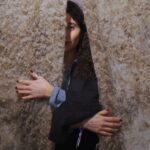
11:00 – 11:30
Shushanik Droshakiryan
Psychedelic Textiles: Luxury in Space
Shushanik Droshakiryan is an interdisciplinary designer blending biomaterial research, textile art, and environmental awareness in immersive installations. She redefines textiles as sensory-driven, dynamic materials that engage light, touch, and movement. Known for her use of Dutch wool waste, she transforms raw wool into large-scale, sustainable pieces, challenging conventional production and waste. Her exhibitions, including those at Munich Fabric Start and Dutch Design Week 2024, offer multi-sensory experiences.
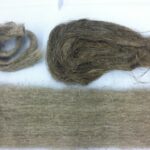
11:20 – 11:50
Joan den Exter & Willemien Ippel
Linen Stewardship
The Linen Project wants to involve as many citizens as possible in growing and making textiles so that we know what is needed to make textiles. It is experienced as hopeful that it is possible to grow and make your own textiles in a community and to share knowledge with each other.

11:35 – 12:05
Jules Péan
New Rocks. Transforming Mining and Construction Waste into Recycled Material
Jules Péan is a Luxembourgish Designer who graduated in 2024 from the Design Academy Eindhoven with his project New Rocks. His work focuses on material transformation, drawing inspiration from geological processes to create new matter from industrial waste.
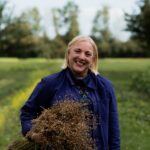
12:10 – 12:40
Willemien Ippel, The Linen Project
1m2 Flax and a bedspread (NL)
Willemien Ippel is a cultural entrepreneur, co-founder of Crafts Council Nederland and co-initiator of The Linen Project. From a background in textiles and a great love for this material, programs are developed (and implemented) that contribute to a greater understanding and appreciation of craft processes and the deep knowledge and expertise that are connected to them.
Wad van waarde
Wad van Waarde is committed to a plastic-free Wadden Sea by creating a circular makers’ network. They connect farmers, designers, students, and entrepreneurs to develop sustainable, locally-made alternatives to plastic products. By building an integrated value chain, they protect nature, support the local economy, and prevent plastic from reaching the sea.
Hosted by Wad van Waarde
Alba concepts
Alba Concepts makes circularity concrete, measurable, and actionable. They provide strategic guidance, integrating sustainability across all project phases, from concept to demolition. Their expertise spans buildings, areas, and portfolios, helping organizations embed sustainability with clear goals. By thinking beyond circularity and redefining systems, they drive real impact in the built environment.
Hosted by Alba Concepts
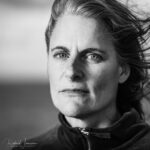
12:45 – 14:30
Eileen Blackmore
Local Value Chain Discussion: from plastic soup to vegetable soup > linen textiles from locally grown flax (NL)
In this value chain discussion, various links in the chain enter into dialogue with each other. This highlights the unique collaboration and discusses the developments of our linen: from initiator to farmer and from producer to designer.
Eileen Blackmore is the founder of House of Design, in which circular system changes are designed. One of these circular systems is the Wad van Waarde program, in which steps are taken ‘from plastic soup to vegetable soup’. For Wad van Waarde, House of Design has set up a local value chain from flax to linen textiles to soil. To this end, Eileen, together with the growers of the Waadrâne collective and Regiodeal Natuur Inclusieve Landbouw, has reduced the cultivation of flax in the Northern Netherlands and the chain of growing, processing, spinning, weaving and sewing within a distance of one day’s drive.
12:25 – 17:25
Private event
13:00 – 17:25
Erik tempelman
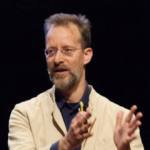
14:35 – 15:05
Erik Tempelman, TU Delft
The Secret Science Of Super-Strong Materials
Erik Tempelman (Vlissingen, 1969) holds an MSc in aerospace engineering and a PhD in materials and sustainability, both from TU Delft. At present, he holds a position as associate professor at this same university, with over 30 years of accumulated knowledge on materials, design, and innovation. His publications include several academic textbooks and many professional publications – 20+ in the Dutch professional journal Constructeur alone. An enthusiastic speaker, Erik is known for his ability to explain even the most complex topics in simple terms – and make you want to learn more.
Fibershed Nederland
Fibershed Nederland promotes sustainable textile production by using local, organic resources and fostering collaboration. Founded in 2021, it supports regenerative farming, circular supply chains, and biodegradable textiles. By raising awareness and advocating for change, Fibershed proves that fashion can positively impact people and the planet while reducing waste and environmental harm.
Hosted by Fibershed Nederland

15:25 – 15:55
Stijntje Jaspers, Fibershed NL
Through Connections We Thrive
Stijntje Jaspers is co-founder and program director of Fibershed NL, a value network for entrepreneurs in the natural and local textile sector. With 25+ years in leading creative roles in the Dutch fashion industry, she is dedicated to advancing bio-circular textiles and clothing. With her creative and conceptual mindset, Stijntje connects key players in the industry. She is also the author of Goede Gespreksstof.
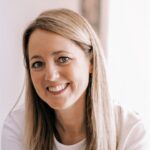
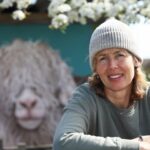
16:00 – 16:30
Bianca Zomer, Zeefier
& Reina Ovinge, The Knitwit Stable
Through Wool & Dye Connections, We Thrive
Bianca Zomer is the co-owner and head of business development at Zeefier, a Dutch startup (2020) producing industrial textile dyes from seaweed. With a background in textiles and business, she joined in 2022. Zeefier uses 100% natural, biodegradable, and non-toxic dyes, sourcing seaweed from local farms, food and cosmetics waste streams, and beach residue to transform the textile industry.
Reina Ovinge is the founder of The Knitwit Stable, a knowledge institute that values Dutch wool as a sustainable raw material. Inspired by the principles of regenerative leadership, and with wool as the driver of change, the small-scale production facility on the farm in Baambrugge supports a bio-circular production chain. This approach makes it possible to create valuable wool-based products while working in line with traditional and animal-friendly livestock farming methods.
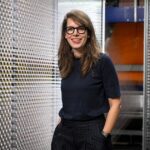
16:35 – 17:05
Annemieke Koster & Ackelien Hageman, Enschede Textielstad
Through Weaving Connections, We Thrive
Annemieke Koster is the founder and owner of Enschede Textielstad, an industrial weaving mill producing fabrics for fashion and interior design using local, natural, and recycled yarns. Her goal is to enable brands focused on sustainability and reshoring to access high-quality, locally made textiles. She also collaborates with entrepreneurs, designers, and producers to build a circular and local textile economy.